Polycystic Ovary Syndrome (PCOS) affects girls and women of reproductive age, but its first signs can start showing up as early as the teenage years. With symptoms like irregular periods, unexpected weight gain, and stubborn acne, PCOS can impact both physical & mental health. Knowing the early signs of PCOS in teenagers is necessary for managing the condition effectively.
What Are the First Signs of PCOS in Teenagers?
There are some key indicators for PCOS in teenagers.
1. Irregular Periods:
One of the most noticeable signs of PCOS in teenagers is irregular periods. While it’s normal for periods to be a bit off when they first start, with PCOS, periods can remain irregular for years. For teens with PCOS, irregular periods might look like:
- Longer Time Between Periods: Teens with PCOS might go more than a month without a period.
- Missed Periods: They might have fewer than eight periods a year or even several months without a period.
- Very heavy or light Periods: Some may experience unusually heavy bleeding, while others might have very light periods.
These irregular periods happen because PCOS causes a hormone imbalance, which affects ovulation. For most teens, some irregularities in their periods are normal and often settle down over time without needing treatment. However, if the irregular periods are caused by PCOS, they don’t usually get better by themselves; instead, they often need medical attention or lifestyle changes to improve.
2. Stubborn Acne
Acne can be a sign of PCOS, especially if it’s more severe and doesn’t cure with regular treatments.
- Acne that shows up on the jawline, chest, or back can be linked to PCOS.
- Acne from PCOS is often more painful, red, and harder to clear up.
- Teens with PCOS may have very oily skin, which can make acne worse.
This type of acne is caused by high levels of male hormones, called androgens, which increase oil production. If a teen has acne like this along with irregular periods, it might be worth talking to a doctor about PCOS.
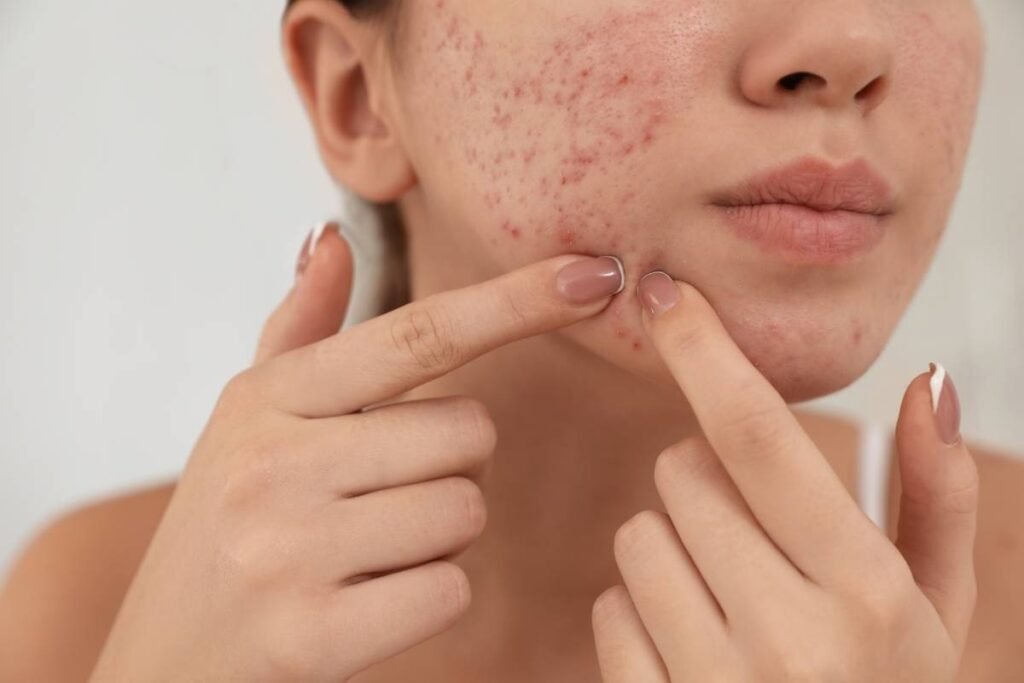
3. Unwanted Hair Growth / Hirsutism:
One of the common signs of PCOS is unwanted hair growth, especially in areas where men usually grow hair. This is due to higher levels of male hormones, called androgens, which PCOS can cause.
With PCOS, hair may grow on the face (like on the upper lip, chin, or jawline), chest, and back. This type of hair is usually thicker and darker, due to which they are more noticeable. Androgens, the male hormones, are naturally found in everyone, but women and girls usually have lower levels. PCOS can cause these levels to rise, which then triggers unwanted hair growth.
Unwanted hairs look very frustrating and causes a lack of confidence. These hairs can be removed by waxing or removal creams. I recommend waxing instead of creams, waxing is painful but more effective. Some people also try treatments like laser hair removal or medication from a doctor to reduce hair growth.
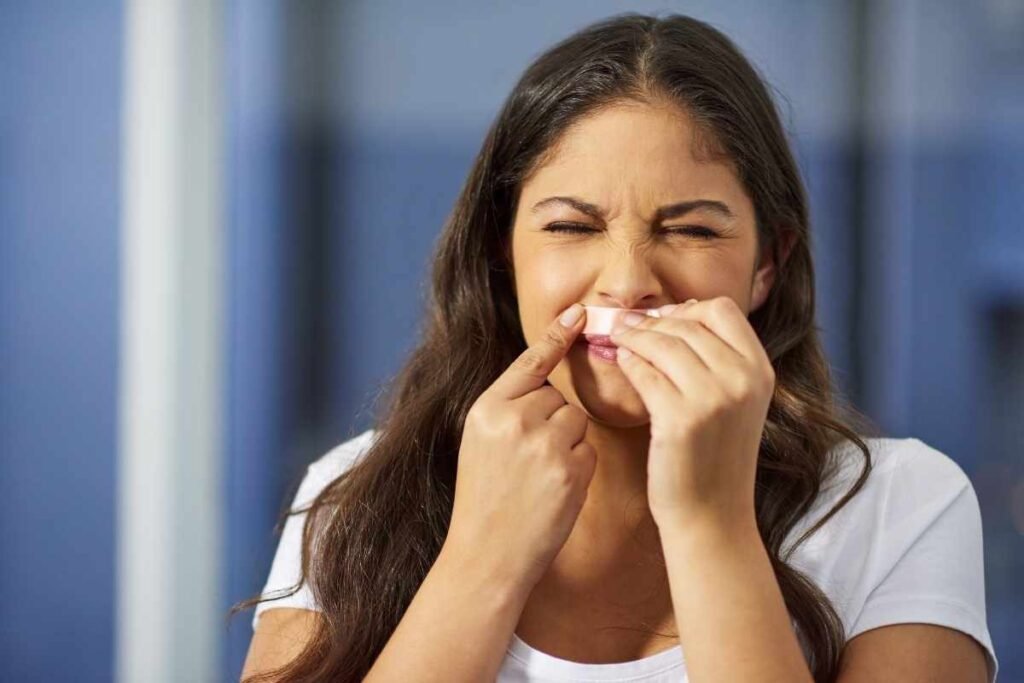
4. Weight Gain:
Weight gain is another common symptom of PCOS and can be one of the hardest symptoms to manage. Many teens with PCOS notice that they gain weight easily, especially around their belly area.
PCOS affects how the body uses insulin, the hormone that helps control blood sugar. When the body doesn’t use insulin properly, it can lead to higher insulin levels (insulin resistance). High insulin levels often cause weight gain.
With PCOS, weight gain isn’t just about eating habits or exercise. The hormone imbalance makes it harder to lose weight, even with healthy eating and regular exercise. This can be discouraging, but it’s important to remember that it’s not your fault, this is part of the condition and can be treated.
To lose weight in PCOS, you just need to consume low-carb foods that don’t cause big spikes in blood sugar, like whole grains, vegetables, and lean proteins. Regular exercise can also help, especially activities that are fun and easy to stick with, like walking, swimming, or dancing. Some doctors may also suggest medications to help control insulin levels.
Also Read: How I Lost Weight with PCOS
Weight gain with PCOS isn’t always easy to manage, but making small lifestyle changes can help.
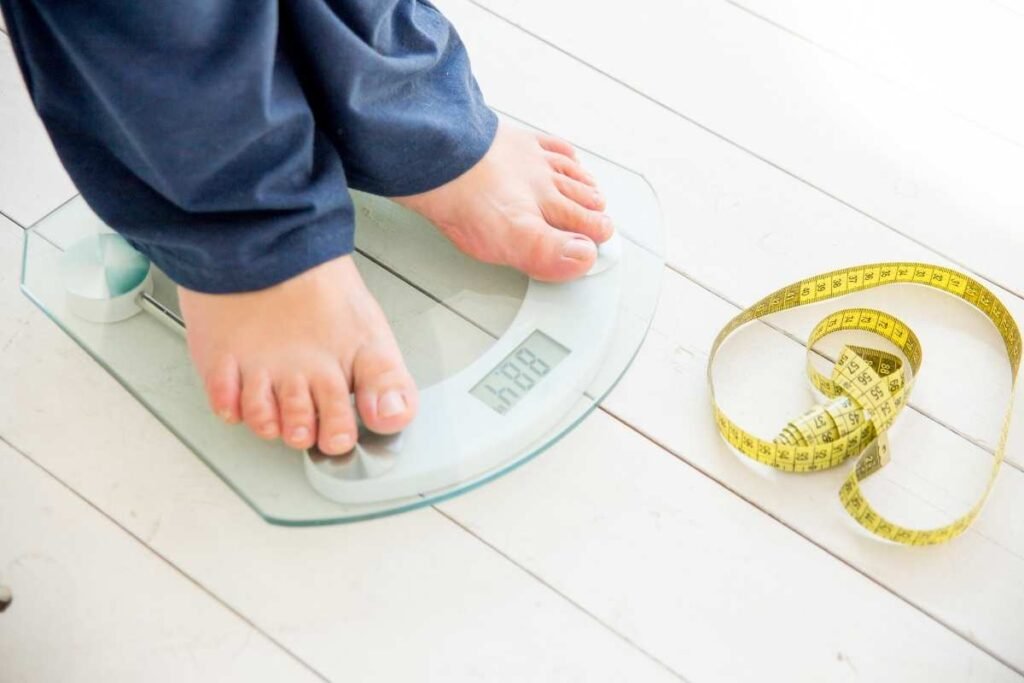
5. Acanthosis Nigricans:
Acanthosis nigricans is a skin condition that appears as dark, thick, and sometimes velvety patches of skin.
These patches are usually darker than the rest of your skin and have a rough, velvety feel. They can appear in folds and creases, like on the back of the neck, under the arms, or in the groin area.
Acanthosis nigricans is often linked to insulin resistance, which is common in people with PCOS. As mentioned earlier, insulin resistance means the body can’t utilize insulin properly, which causes high insulin levels. This can lead to skin changes, including these dark patches.
Is It Dangerous? No, it’s not harmful on its own, but it’s a sign that there might be an underlying health issue, like PCOS or insulin resistance.
Acanthosis nigricans can be a helpful early sign to watch for, as it often shows up before other symptoms.
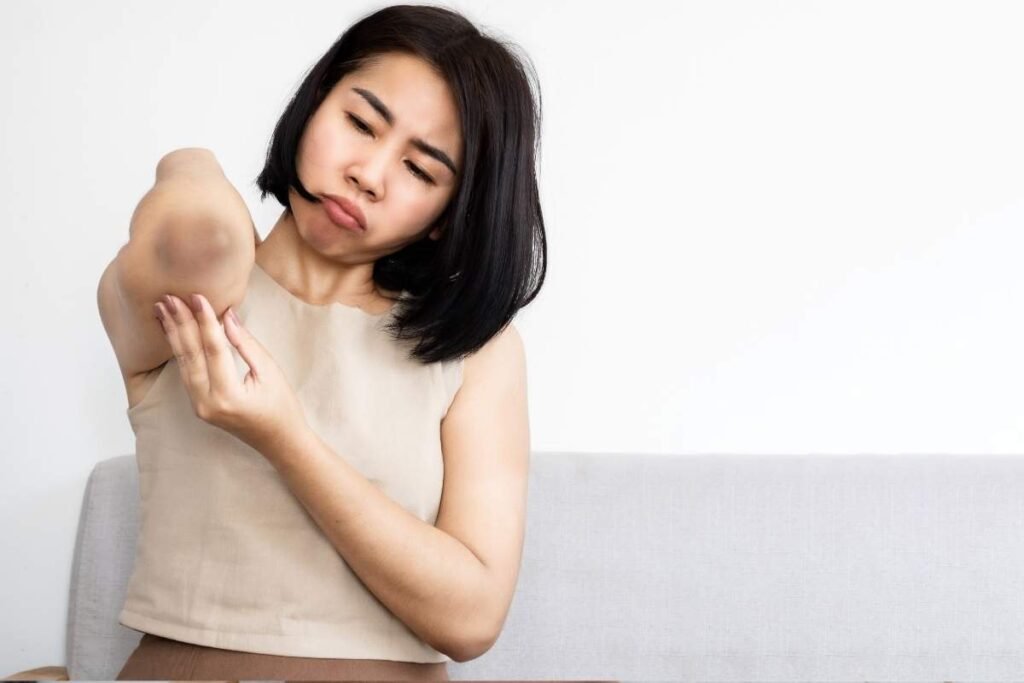
6. Thinning Hair on the Scalp:
Another common sign of PCOS is hair thinning, especially on the scalp. Hair on the scalp may start to thin out, especially around the top and front areas. Some people notice a wider part or that their hair is not as full as it used to be. With PCOS, higher levels of male hormones (androgens) can affect hair growth. Androgens can cause hair to fall out on the scalp while increasing hair growth in unwanted areas like the face or body.
There are ways to slow down hair thinning, like using gentle hair products, eating a balanced diet, and talking to a doctor about possible treatments. Some medications can help with hair loss if it’s severe.
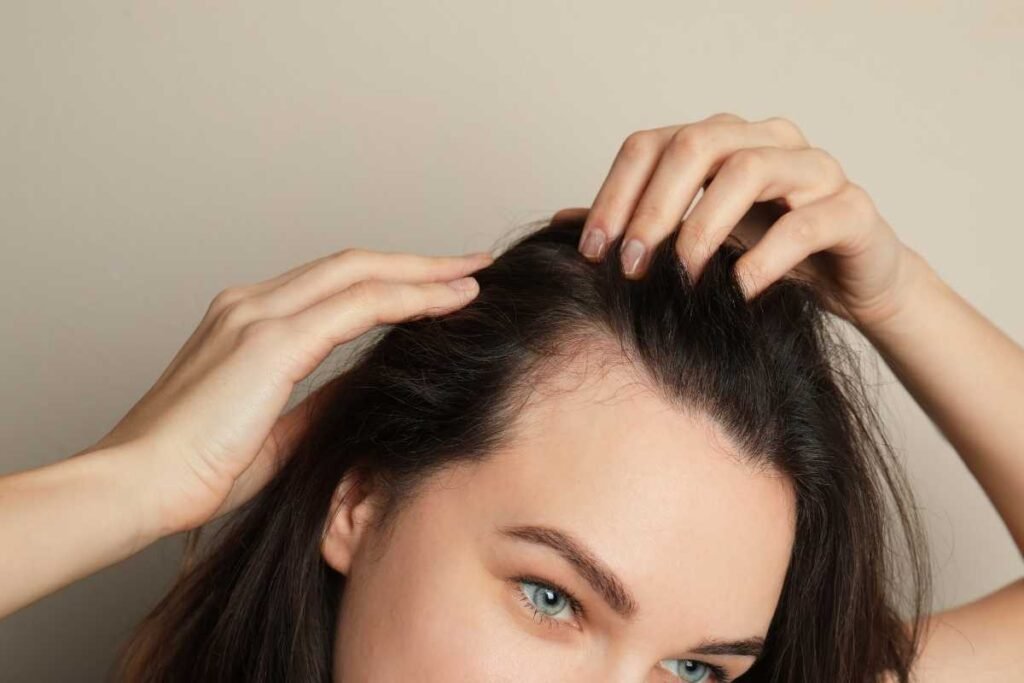
7. Oily Skin and Dandruff:
Many teens with PCOS have oilier skin than usual, which can lead to acne. The skin may feel greasy or shiny, especially around the forehead, nose, and chin.
PCOS increases androgen levels, which can make the skin’s oil glands work harder, that produces extra oil.
With oily skin often comes dandruff, which are white or yellow flakes on the scalp. Dandruff can be itchy and sometimes embarrassing.
Washing the face and scalp regularly with gentle cleansers can help control oil and dandruff. Using shampoos made to reduce dandruff or talking to a doctor about medicated options may also help.
People Also Ask:
Is it normal for a 15-year-old girl to have PCOS?
Yes, a 15-year-old can have PCOS. About 1 in 10 teen girls and young women have polycystic ovarian syndrome (PCOS). This condition means there is a hormone imbalance, and the ovaries make too many male hormones, like testosterone (common androgen). Normally, the ovaries only make a little bit of these hormones, but with PCOS, they make more than usual.
How do you know if a girl has PCOS?
A girl may have PCOS if she shows signs like:
1. Irregular or missed periods
2. Excess hair growth on the face or body
3. Severe acne or oily skin
4. Weight gain, especially around the belly
5. Thinning hair on the scalp
How do I know if my periods are irregular because of PCOS?
With PCOS, periods may be very unpredictable, with long gaps between them (more than 35 days), very heavy or very light bleeding, or sometimes no periods at all for several months.
Can PCOS girls conceive?
Yes, pregnancy is possible with PCOS even naturally or with medical treatments.
Also Read: Can You Get Pregnant With PCOS without Treatment?
Is acne a common sign of PCOS?
Yes, acne can be a sign of PCOS, especially if it’s severe and affects the jawline, chest, or back. This is due to extra oil production caused by hormone imbalances.
Conclusion:
If you notice these symptoms, then it is possible that you have PCOS. So it is essential to consult your doctor and stay connected with us for helpful guides and tips to manage PCOS.

